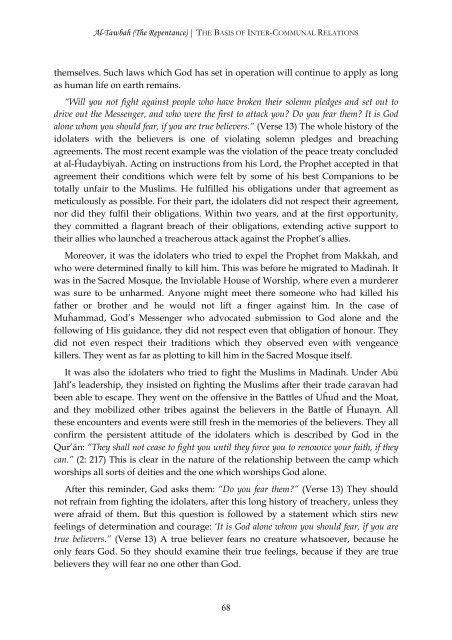Volume 8 Surah 9 - Enjoy Islam
Volume 8 Surah 9 - Enjoy Islam
Volume 8 Surah 9 - Enjoy Islam
- No tags were found...
Create successful ePaper yourself
Turn your PDF publications into a flip-book with our unique Google optimized e-Paper software.
Al-Tawbah (The Repentance) | THE BASIS OF INTER-COMMUNAL RELATIONSthemselves. Such laws which God has set in operation will continue to apply as longas human life on earth remains.“Will you not fight against people who have broken their solemn pledges and set out todrive out the Messenger, and who were the first to attack you? Do you fear them? It is Godalone whom you should fear, if you are true believers.” (Verse 13) The whole history of theidolaters with the believers is one of violating solemn pledges and breachingagreements. The most recent example was the violation of the peace treaty concludedat al-Ĥudaybiyah. Acting on instructions from his Lord, the Prophet accepted in thatagreement their conditions which were felt by some of his best Companions to betotally unfair to the Muslims. He fulfilled his obligations under that agreement asmeticulously as possible. For their part, the idolaters did not respect their agreement,nor did they fulfil their obligations. Within two years, and at the first opportunity,they committed a flagrant breach of their obligations, extending active support totheir allies who launched a treacherous attack against the Prophet’s allies.Moreover, it was the idolaters who tried to expel the Prophet from Makkah, andwho were determined finally to kill him. This was before he migrated to Madinah. Itwas in the Sacred Mosque, the Inviolable House of Worship, where even a murdererwas sure to be unharmed. Anyone might meet there someone who had killed hisfather or brother and he would not lift a finger against him. In the case ofMuĥammad, God’s Messenger who advocated submission to God alone and thefollowing of His guidance, they did not respect even that obligation of honour. Theydid not even respect their traditions which they observed even with vengeancekillers. They went as far as plotting to kill him in the Sacred Mosque itself.It was also the idolaters who tried to fight the Muslims in Madinah. Under AbūJahl’s leadership, they insisted on fighting the Muslims after their trade caravan hadbeen able to escape. They went on the offensive in the Battles of Uĥud and the Moat,and they mobilized other tribes against the believers in the Battle of Ĥunayn. Allthese encounters and events were still fresh in the memories of the believers. They allconfirm the persistent attitude of the idolaters which is described by God in theQur’ān: “They shall not cease to fight you until they force you to renounce your faith, if theycan.” (2: 217) This is clear in the nature of the relationship between the camp whichworships all sorts of deities and the one which worships God alone.After this reminder, God asks them: “Do you fear them?” (Verse 13) They shouldnot refrain from fighting the idolaters, after this long history of treachery, unless theywere afraid of them. But this question is followed by a statement which stirs newfeelings of determination and courage: ‘It is God alone whom you should fear, if you aretrue believers.” (Verse 13) A true believer fears no creature whatsoever, because heonly fears God. So they should examine their true feelings, because if they are truebelievers they will fear no one other than God.68
















